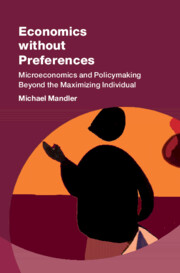Book contents
- Frontmatter
- Contents
- Figures
- Preface
- 1 Introduction: Marginal Utility Matters
- Part I Trade-Offs and Rationality
- Part II Economic Analysis and Policy Without Preferences
- 7 Marginal Utility and the Volatility of Prices
- 8 The Trouble with Welfare Economics
- 9 Welfare and Policymaking: Pareto without Preferences
- 10 Utilitarianism without Utility
- 11 Production and the Enforcement of Rationality
- 12 Conclusion: Custom and Flexibility
- Appendix
- Bibliography
- Index
8 - The Trouble with Welfare Economics
from Part II - Economic Analysis and Policy Without Preferences
Published online by Cambridge University Press: 02 January 2025
- Frontmatter
- Contents
- Figures
- Preface
- 1 Introduction: Marginal Utility Matters
- Part I Trade-Offs and Rationality
- Part II Economic Analysis and Policy Without Preferences
- 7 Marginal Utility and the Volatility of Prices
- 8 The Trouble with Welfare Economics
- 9 Welfare and Policymaking: Pareto without Preferences
- 10 Utilitarianism without Utility
- 11 Production and the Enforcement of Rationality
- 12 Conclusion: Custom and Flexibility
- Appendix
- Bibliography
- Index
Summary
When agents, due to incomplete preferences, fail to have well-defined marginal valuations for goods, a great many government policies will maximize social welfare or achieve efficiency. Welfare economics then becomes useless as a practical guide to decision-making. For example, the values agents assign to increases in a public good will be discretely smaller than the values they assign to decreases. For society as a whole, a large valuation gap will form and a wide range of quantities of the public good will therefore qualify as optimal. Applied welfare economics and cost–benefit analysis bypass this obstacle by paying attention only to agents’ smallest valuations, thus slanting policymaking against public goods. The multiplicity of preferences that agents view as reasonable also neuters Pareto efficiency as a policy guide: virtually any policy change is likely to harm some of the preferences agents deem reasonable.
- Type
- Chapter
- Information
- Economics without PreferencesMicroeconomics and Policymaking Beyond the Maximizing Individual, pp. 152 - 175Publisher: Cambridge University PressPrint publication year: 2025

